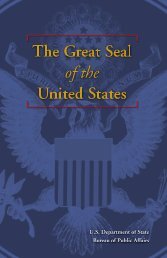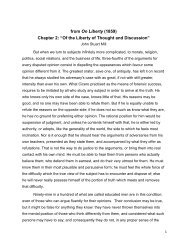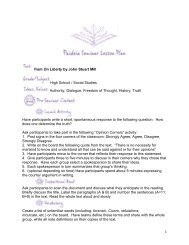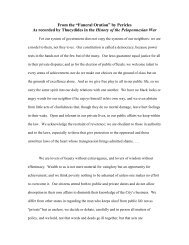Rousseau_contrat-social
Create successful ePaper yourself
Turn your PDF publications into a flip-book with our unique Google optimized e-Paper software.
history then confirms, instead of invalidating, the principle I have<br />
laid down.<br />
29. "Omnes enim et habentur et dicuntur tyranni, qui potestate utuntur<br />
perpetua in ea civitate quæ libertate usa est" (Cornelius Nepos, Life of<br />
Miltiades). (For all those are called and considered tyrants, who hold<br />
perpetual power in a State that has known liberty.) It is true that<br />
Aristotle (Ethics, Book viii, chapter x) distinguishes the tyrant from<br />
the king by the fact that the former governs in his own interest, and<br />
the latter only for the good of his subjects; but not only did all Greek<br />
authors in general use the word tyrant in a different sense, as appears<br />
most clearly in Xenophon's Hiero, but also it would follow from<br />
Aristotle's distinction that, from the very beginning of the world,<br />
there has not yet been a single king.<br />
30. In nearly the same sense as this word has in the English Parliament.<br />
The similarity of these functions would have brought the consuls and the<br />
tribunes into conflict, even had all jurisdiction been suspended.<br />
31. To adopt in cold countries the luxury and effeminacy of the East is<br />
to desire to submit to its chains; it is indeed to bow to them far more<br />
inevitably in our case than in theirs.<br />
32. I had intended to do this in the sequel to this work, when in<br />
dealing with external relations I came to the subject of confederations.<br />
The subject is quite new, and its principles have still to be laid down.<br />
33. Provided, of course, he does not leave to escape his obligations and<br />
avoid having to serve his country in the hour of need. Flight in such a<br />
case would be criminal and punishable, and would be, not withdrawal, but<br />
desertion.<br />
34. This should of course be understood as applying to a free State; for<br />
elsewhere family, goods, lack of a refuge, necessity, or violence may<br />
detain a man in a country against his will; and then his dwelling there<br />
no longer by itself implies his consent to the contract or to its<br />
violation.<br />
119











